#socioeconomic crisis
Explore tagged Tumblr posts
Text
The Humanitarian situation in Lebanon.
Mr Imran Riza, the United Nations Humanitarian Coordinator for Lebanon briefed UN correspondants about the impact of the exchanges of fire between Israel and the Hezbollah is having on civilians in south Lebanon.
UN Humanitarian Coordinator for Lebanon Imran Riza, told reporters Tuesday 20 August in New York that "nearly 200,000 people have been displaced by the exchange of fire across the Blue Line between Lebanon and Israel. He added that more than 110,000 people remain within ten kilometers of the blue line in areas of South Lebanon that are impacted daily by shelling and air strands. "At least 130 civilians have been killed in Lebanon, including the ten Syrian nationals this past weekend, 21 paramedics and at least three journalists have also been killed," Riza stated. The Humanitarian Coordinator also said, "Lebanon was already facing a grim situation of protracted political, financial, socioeconomic crisis before October last year. Now in 2024 those in need have reached 3.7 million people."
Watch the Humanitarian situation in Lebanon!
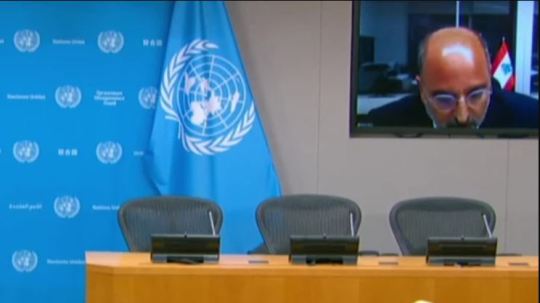
1 note
·
View note
Text
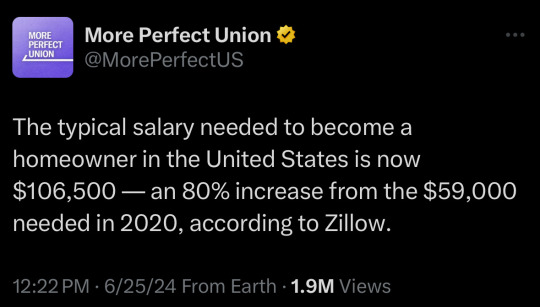
Source
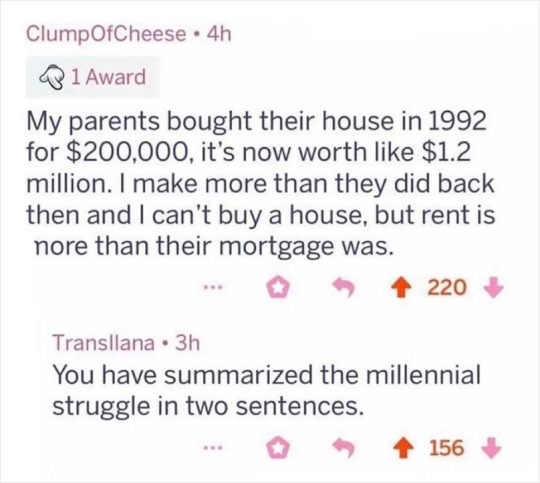
#housing#housing crisis#news#current events#the left#income inequality#socioeconomic inequality#government#progressive#twitter post
8K notes
·
View notes
Text
Scientists outline a bold solution to climate change, biodiversity loss, social injustice
#science#government#ecology#socioeconomic#sociology#climate change#climate crisis#earth#late stage capitalism#capitalism#anti capitalism#anti work#humanity#humans#homo sapiens#scientists#small steps#politics#us politics#world events#world politics
9 notes
·
View notes
Text
Some days I'm pretty content with my childhood other days I'm ripping my hair out because it just doesn't add up !! someone is hiding things from me !! I don't trust anyone !!
#im studying 'family as a psycosocial context' rn and its been pretty interesting!#and i was talking to my mom an article with an evolutionary perspective#bc we've talked before abt how this area of psychology can come off as dismissive abt socioeconomic factors & put unfair pressure on mothers#so i brought it up bc the paper didnt define parenting in terms of good/bad which was interesting !#but then at the end i said something abt 'the article talks abt abuse which obviously isnt relevant for me'#and she wouldnt answer me but her eyes were all watery and weird and I DONT LIKE THAT#like girl 😟 i was coming to terms with the occasional childhood neglect but abuse ? dont even tell me that bc what#like i know things werent perfect for me growing up but i hate how weird my mom is abt everything#and she starts crying if we get too much into it so i feel a little bad bringing it up#i also feel like when i do get new information abt something in my past it always makes me have a crisis#so maybe its just not worth it ?#bc i do feel like im in a rly good place rn and i dont need to know if i was 'abused' whatever that means#what i do know is bad enough and makes me sad as it is#i think the reason i get so paranoid abt it is because i have trouble remembering the stuff that has been told to me#and some vague things i do remember have been refuted ? so i cant rly trust my own memory#but idk if i can trust anyone else either#i mean i do trust my mom generally but shes so emotional and guilt-prone that im not sure what to believe#what i do know for sure is that there is a lot shes holding back in terms of what shes told me#which i dint love tbh#personal
11 notes
·
View notes
Text
caught up with a good friend tonight, we’ve texted and talked on social media but this is the first time in possibly a year that we’ve actually talked on the phone, and it was so refreshing and renewing. he’s one of the smartest and most inspiring people I know — just overflowing with care for people and the planet and actually walking the talk. anyways it turns out we both just started reading The Mushroom at the End of the World: On the Possibility of Life In Capitalist Ruins by Anna Tsing and we’re going to talk again and discuss it once I’ve caught up to where he is and I am SO excited!!! :))
#fr every time we talk it feels like a refreshing drink of cold clear water but like. for my brain#like I love my other friends but none of them are on exactly my same wavelength re:#the threads connecting the climate crisis + ongoing pandemic + socioeconomic issues#but the two of us can literally talk for hours bouncing ideas and reflections and book recs etc. back and forth#man I am so grateful for my friend!!#personal#diaryposting on main again. and what of it
2 notes
·
View notes
Text
How can we not be depressed while living poorly in a dying world ?
#as said on tumblr once#there is no ethical way to work on individual emotional distress without annowledging the socioeconomic geopolitical fuckery#by user wolfinthethorns#and that's fucking true#there's bo future to believe in#we are poor#we are unemployed#we are hungry#we are cold#we are so tired#anxiety#depression#mental illness#environmental issues#economical crisis#political nonsense#shitty world#gen z#millenials#textpost
4 notes
·
View notes
Text
Global Mental Health Crisis in Teens and Its Impact on Future Workforce – Asrar Qureshi’s Blog Post #848
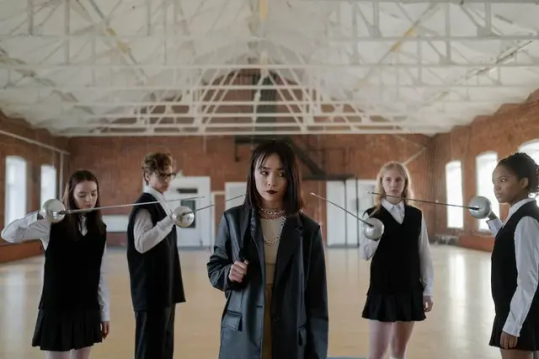
View On WordPress
#Asrar Qureshi#Blogpost848#Crisis#economic crisis#Impact#Mental Health#Pharma Veterans#Social Media#Societal Culture#Socioeconomic Impact#Suicide#Teens#Workforce#Youth
0 notes
Note
I have seen claims by misogynists that outcomes for children raised by single fathers are better than for children raised by single mothers, even when controlling for the income of the parent. Is there any actual evidence to support this?
Hi Anon!
I have found some interesting information about this topic, but I want to preface this by acknowledging how difficult it is it research this topic. Why? Because the vast majority of single parents are women/mothers, and even when men are single fathers their demographics are so substantially different from single mothers. As a result most of the research on this topic runs into issues with both getting a large enough sample for single-fathers and with "comparing apples and oranges" when a sample is gathered.
For example, according to Pew Research Center in 2017, only 29% of single parents are fathers, and this was a notable increase from the 12% in 1968 [1]. This disparity makes it incredibly difficult to get "matched samples" (i.e., where other traits/aspects are held constant) for single mothers and single fathers.
In addition, this 2020 study [2] showed that almost half of single mothers are in either the at-risk or in-crisis poverty categories compared to less than a quarter of single fathers. This pattern is long-standing, as this 2001 study shows [3]
This is a pretty crucial compounding factor given past evidence of the effect of socioeconomic status on child outcome. Specifically, it's fairly well established that children from single-parent households do worse than children two-parent households [3]. However, "econometric tests using a variety of background controls ... show little evidence that a parent's presence during childhood affects economic well being in adulthood" [3]. This indicates that it's some other factor (e.g., poverty, peer relations) that is driving the negative outcomes of children from single-parent homes.
All of that being said, there is some research that provides some preliminary information:
---
A Literature Review
First up is this 2015 review of research on single fathers [4]. Reviews attempt to provide a comprehensive account of the current research, and this one looked at all research between 1970-2013.
Their demographic findings:
"friends and family regularly complimented fathers and offered them more help and social invitations ... Mothers, in contrast, did not receive the same level of kudos and aid"
"in terms of income, education, and poverty, single fathers are generally less well-off than married fathers, but they are better off than single mothers"
"single fathers are ... more likely to have other adults in the household" (i.e., cohabitating with a partner, but still considered single as they are not married)
single fathers also "tend to have custody of a smaller number of children" and have custody of "older children" on average
Parental involvement:
"unpartnered single mothers rated higher on involvement than single dads on all 10 measures [of involvement]"
"single fathers spend slightly less time caring for children than single mothers, but more time than married fathers"
"single fathers are less close to and less involved with their children's friends and school, and monitor and supervise their children less than single mothers do"
"Compared to single mothers and two-parent families, single fathers had the lowest [parental] supervision score"
Child outcomes:
"no differences in the likelihood of teen marriage, teen birth, premarital birth, or marital disruption between youths in single-mother households and youths in single-father households"
"for internalizing behaviors ... and academic performance ... outcomes for children from single-father and single-mother households are similar" (internalizing behaviors include things like depression, anxiety, and low self-esteem)
but children of single fathers show higher levels of "externalizing behavior (e.g.,antisocial and violent behavior) and substance use"
"alcohol and drug behaviors, as well as delinquency rates, were highest in single-father homes"
"teachers judged youths raised in a single-father household as less successful at getting along with others and putting forth effort" and there "were no significant differences on self-concept or relationships with peers"
"controlling for socioeconomic resources, children from single-father families had slightly lower standardized test scores"
In summary, the review indicates that (1) single fathers have economic and social advantages over single mothers, (2) single mothers are equally or more involved with their children, depending on the measurement, and (3) children in single mother homes have either equal or superior outcomes to children in single father homes.
---
Other Research
I did find another more recent (2019) study [5, emphasis mine] that found "children living with divorced single mothers performed as well as children from intact families, whereas children living with divorced single fathers and stepparents were disadvantaged in academic performance and subjective wellbeing" in China. I include this study because (1) all the other research I presented is very western-centric and (2) the data source is a nationwide, representative, longitudinal study of mainland China, which are all factors that make the data high quality. That being said, I'd want to see replication of these findings before drawing too many conclusions from them.
There's also this interesting study [6] examined the effects of single-mother and single-father families on youth crime in aggregate. In other words, they looked at the community concentration of single-mother families and single-father families on crime statistics in that community. I include this study mostly because they have excellent literature review at the beginning, but I'll also address their own findings.
They found that the concentration of single-mother families was associated with more youth crime on an aggregate level. This finding is has several important caveats, however, which I'll list below. (And the researcher actually did an excellent job explaining these! It's just still a likely source of confusion.)
"In most cases a correlation at the aggregate level cannot be used to prove the corresponding correlation at the individual or household level." -> This means that their findings are an interesting examination of community trends (e.g., "lower level of social control in the community increases youth crime") but not evidence of outcomes for the single-mother/single-father/dual-parent children themselves.
The average single-father family concentration was ~3% compared to the average single-mother family concentration of 12%. -> This greatly limits the conclusions that can be drawn here (and links back to the two issues I prefaced this post with). For example, it's possible that single-father family concentration was not linked to aggregate crime statistics purely because no community concentration reached the threshold necessary to exert an effect.
There are other confounding factors that cannot be eliminated using an aggregate approach.
The important aspect of this study is that it suggests that it may not be single-parenthood itself that results in disadvantaged outcomes for the children (as is also suggested by [3]); instead it may be a community-level effect where higher density of single-parents is correlated with other socioeconomic factors that is then correlated with disadvantaged outcomes. (They even note this in the study, indicating that single-mother households "has been used as an indicator of community poverty, economic deprivation or economic disadvantage in numerous studies, and it has been shown that the variable correlates well with other indicators such as low income, poverty, low education, unemployment, public assistance and rental housing".)
---
Same-sex Parents
To preempt any unfortunate interpretations of this post (re: the need for two parents/biological parents/a mother and a father) I also want to explicitly indicate that children raised by same-sex parents do just as well as children raised by different-sex parents.
This international review [7] found that "after adjusting for socioeconomic factors such as income and education, no significant differences are discernible in health and development between children of same-sex couples versus children of different-sex couples." They also found that "children of same-sex couples outperform their peers on matters of education and civic engagement."
This meta-analysis [8] of 19 studies found the "results confirm previous studies in this current body of literature, suggesting that children raised by same-sex parents fare equally well to children raised by heterosexual parents."
This study [9] used a longitudinal dataset to find that any academic differences between children of same-sex and different-sex parents was "nonsignificant net of family transitions" (e.g., divorce).
This large, longitudinal, representative study from the Netherlands [10] found "children raised by same-sex parents from birth perform better than children raised by different-sex parents in both primary and secondary education."
This large, population-based US survey [11] found "children of lesbian and gay parents did not differ from children of heterosexual parents in emotional and mental health difficulties" and higher levels reported by bisexual parents was eliminated after "adjusting for parental psychological distress".
Another large, representative sample [12] from the Netherlands found "no significant disadvantages for children with same-sex parents compared to different-sex parents" in "children’s behavioral outcomes"
This article [13] addresses one of the major challenges to the no differences hypothesis, describing the "major deficiencies" in the paper arguing against the no differences hypothesis.
A number of other reviews/commentaries (e.g., [14-15]) point out that there are methodological limitations (e.g., limited sample size, cross-sectional study design) for most of the research on this topic, but still acknowledge that almost all the current, peer-reviewed, research supports the "no differences" hypothesis. (Also, some of these concerns have since been partially addressed.)
All of this indicates that having same-sex parents is not harmful to children. Whatever factor drives the poorer outcomes associated with single-parent families (e.g., lower economic status), it is not the mere-absence of the other-sex parent.
---
Conclusion
So, in conclusion, children in single-mother families are as-well-off or better-off than children in single father families. Both groups of children tend to have poorer outcomes than children in two-parent (different or same-sex) families. However, controlling for related socioeconomic factors (e.g., income, death in the family, etc.) ameliorates this difference.
I hope this helps you, Anon!
References under the cut:
Livingston, Gretchen. “The Changing Profile of Unmarried Parents.” Pew Research Center, 25 Apr. 2018, https://www.pewresearch.org/social-trends/2018/04/25/the-changing-profile-of-unmarried-parents/.
Lu, Y. C., Walker, R., Richard, P., & Younis, M. (2020). Inequalities in poverty and income between single mothers and fathers. International journal of environmental research and public health, 17(1), 135.
Lang, K., & Zagorsky, J. L. (2001). Does growing up with a parent absent really hurt?. Journal of human Resources, 253-273.
Coles, R. L. (2015). Single‐father families: A review of the literature. Journal of Family Theory & Review, 7(2), 144-166.
Zhang, C. (2020). Are children from divorced single-parent families disadvantaged? New evidence from the China family panel studies. Chinese Sociological Review, 52(1), 84-114.
Wong, S. K. (2017). The effects of single-mother and single-father families on youth crime: Examining five gender-related hypotheses. International journal of law, crime and justice, 50, 46-60.
McNamara, K. (2019, March). The advantages of gay parents: Examining the outcomes of children of same and different-sex parents. In Undergraduate Research Conference Proceedings (Vol. 13, No. 1).
Crowl, A., Ahn, S., & Baker, J. (2008). A meta-analysis of developmental outcomes for children of same-sex and heterosexual parents. Journal of GLBT family studies, 4(3), 385-407.
Potter, D. (2012). Same‐sex parent families and children's academic achievement. Journal of Marriage and Family, 74(3), 556-571.
Mazrekaj, D., De Witte, K., & Cabus, S. (2020). School outcomes of children raised by same-sex parents: Evidence from administrative panel data. American Sociological Review, 85(5), 830-856.
Calzo, J. P., Mays, V. M., Björkenstam, C., Björkenstam, E., Kosidou, K., & Cochran, S. D. (2019). Parental sexual orientation and children's psychological well‐being: 2013–2015 National Health Interview Survey. Child development, 90(4), 1097-1108.
Mazrekaj, D., Fischer, M. M., & Bos, H. M. (2022). Behavioral outcomes of children with same-sex parents in the Netherlands. International journal of environmental research and public health, 19(10), 5922.
Perrin, A. J., Cohen, P. N., & Caren, N. (2013). Are children of parents who had same-sex relationships disadvantaged? A scientific evaluation of the no-differences hypothesis. Journal of Gay & Lesbian Mental Health, 17(3), 327-336.
Schumm, W. R. (2016). A review and critique of research on same-sex parenting and adoption. Psychological Reports, 119(3), 641-760.
Mazrekaj, D., & Jin, Y. (2023). Mental health of children with gender and sexual minority parents: a review and future directions. Humanities and Social Sciences Communications, 10(1), 1-6.
38 notes
·
View notes
Note
hii
so, i have nothing to do with appalachia or even america cause i come from alllll the way over the sea in this tiny town in england…but reading up on this blog or experiences online // my friends who have moved over here from the states has made me think abt the huge similarities in the gentrification and religious aspects from across the globe (and it’s happening everywhere, but this is just from a UK perspective)
theres lots of rich farmland and wealthy rural areas in england. but the further into the country you get, there are towns/places in deep deep poverty because of the dead industries (that goes into heavy british politics) or facing a severe homelessness crisis because everyone is building holiday villas and country retreats. **
we used to live on an old farm before the land got renovated to make space for two other houses along the road. i would find bricks and planks// wooden posts, barbed wire fences etc around which looked ‘eyesore’ (to quote my neighbour) because of how modern the surrounding area was. literally just grey shiplap. everywhere. there were neighbours who had lived there for decades trying to help out with the land; then upon realising that the only field left for miles was now a jumbo golf course, had to move away or got kicked out by the council cause they couldn’t afford to live there and ‘just weren’t needed anymore’. moving away & meeting others myself has made me realise how many people (esp large families) moved down to the overpriced city because they literally had no other option.
** every city has its surrounding land & when they begin bulldozing a village to make another coffee place, they don’t care about you, the land, the cost crisis, your job or your roots
and that’s just my experience in england, that’s not even to mention the rest of the UK (eg. the scottish highlands, most of wales, northern ireland)
but also the heavy religious aspects, the indoctrination, the isolation, churches being built over and turned into pubs/bars and still so many communities believing that it’s just the consequences of the countries sinners..
(and that’s just Christianity cause we all know how Britain has diluted and stripped so much culture and other religions down to nothing.)
god i love these asks from intl folks who note such similarities to appalachian socioeconomic/religious/political circumstances. i think it really highlights how much rural folks really understand each other in a way urban people just can't, and it gives me a nice sense of global solidarity (as much as the shared pains fucking suck)
this was really interesting to read, thanks so much for sharing and i'm sorry this took so long for me to reply to; it's been a weird few months
take care <33
20 notes
·
View notes
Text
Read It and Weep- Part 1
Pairing: NFL!Player!Rafe Cameron x Journalist!Reader
Summary: Sports journalist Y/n is covering a pro-NFL football game when she gets knocked down by wide reciever Rafe Cameron. He helps her up and immediately can't seem to take his eyes off of her as they celebrate their win. After, at the post game conference, him and the reader share an interesting conversation and he learns (earns) her name.
Word Count: 3.5k
Warnings: Violence, swearing, I think that's it honestly.
Song: "My Ordinary Life" by The Living Tombstones
A/n: This might be the most excited I've ever seen @tee-swizzle get over a fic I've written. This is some serious hot and cute and angsty shit, buckle up, it's quite a ride. This is part 1 of 10!
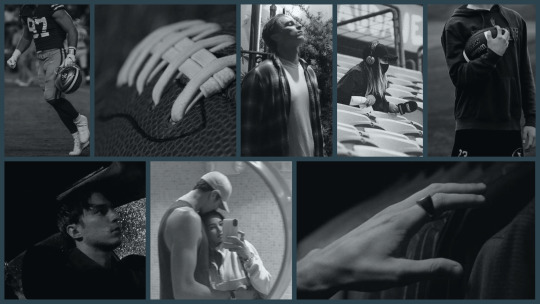
I always thought the only time I would enjoy men running around in costumes would be on Broadway.
The sophisticated, planned, calculated moves, the falsetto notes they hit while running around in expensive costumes that took hours and hours to create. Men on Broadway are just a whole other breed- don’t get me wrong, all actors and actresses alike are all impressive beyond belief, it’s a hard field to be a part of. But there’s something so groundbreaking and heartwarming to see men of all backgrounds doing what they love to do.
There’s just an art to it- Broadway- a beauty that a lot of people brush off and denounce as girly or even something that’s remarkably easy. They call theater kids loony (which coming from one, I’d have to agree just a bit), they’re constantly bullied and harassed but not when they make it to the big times. No- then they are set up on this pedestal where they are to be paid hundreds or thousands of dollars to get on stage, to dance and sing their favorite show tunes together where all of a sudden they’re people to look up to, forgetting all about their high school days and all the failed auditions that teared them down. But once they’re on that stage together, creating music and art, they’re a family in a sense. Leaving it all on the stage for the viewer, us, to enjoy.
A brotherhood.
My new stage looks a little bit differently than it did when I was sixteen.
My new stage consists of something similar- men, running around in matching outfits, same bright lights shining on them, sweat pouring down their necks, and they’re still a brotherhood- maybe even more so in a sense. But with this stage, there’s profanities, there's violence and, most of all, there are too many balls in one place at one time.
Pun so intended.
The world of sports is not one that I saw myself getting into at the ripe age of twenty four, let alone football. I’ve always had a bit of a thing against football players but that happens when you grow up in the theater world where you’re constantly pushed around by the ‘higher class’ of the horrible high school hierarchy, being called names, shoved down stairs, having your lunch tossed into your lap. But the job that I was offered through a local journal in my hometown was just perfect for me- I couldn’t not take it. There would be no other job that could've come around that would’ve given me the same freetime and the ability to still have control over my schedule, all while supporting my home team. It gave me a chance to travel, to learn, and to be surrounded by attractive, sweaty men doing their thing.
There’s a bit of a silver lining to it, I guess.
Working as a journalist for a professional football team was not the intended goal when I got my Bachelors degree in Journalism, nor was it the plan for my Masters. I wanted to go into freelancing or maybe dabble a bit in the socioeconomic crisis our country’s suffering from- maybe even write a few articles on how to save the turtles or some shit.
But football?
I spend most of my days on the sidelines, sketching down stats, learning plays and keeping up in the personal lives of our devoted players. I’m like one of those cheerleading girls I used to hate, practically a groupie of the team at this point. Even the coach and the other behind-the-scenes workers are on a first name basis with me at this point.
Sixteen year old me would be disgusted- repulsed.
Current me? Not so disgusted as I’m watching a bunch of tall, bachelor-like men run around the field at top speed, tackling each other as the crowd colored in all different jerseys scream or boo in unison. I can’t fight the proud smile that’s on my lips as I look out at the field, just right there in front of me- I could reach out and just be a part of it. There’s something to home games that just gets your blood pumping in a special way, especially so close to playoffs, so close to glory and a big old fancy ring for our quarterback and team. It’s every team’s goal for the year but every news agency’s eyes are on us, watching us and the players so closely, betting and guessing that we’ll be the one to win everything this year. No pressure, right?
It’s an honor to be traveling with them all, I couldn’t have been paired with a more respectful group of men, even though some of them don’t even know my name or that I exist. They might see my name occasionally at the bottom of an article I’ve written about their triumphs or losses or they know me as the girl that they accidentally mistake for the water girl and who they then apologize profusely to following the mix up.
Sarah the water girl and I look awfully a lot we’ve learned.
There’s not a lot of time left in the game now, less than two minutes in the last quarter and it’s tight, too close for comfort as the men in the front row of the stands scream their asses off, acting like their words will have any weight in the overall game. With how we’re playing right now, the defensive line tuckered out beyond belief, we’re not looking at winning, especially if they hold possession of the ball like they have been. The other team is smart, I’ll give them that, gnawing down at the clock, running down the time so if we did get the ball, we’d barely have the time to do anything remotely impressive. We’re down by 6 and if we’d just get a touchdown we’d be good and we would win, but we just need to get possession of the ball.
I write down the numbers of the players who’ve stuck out to me the most on this team to calm my nerves; number three Cameron offense, number seventeen McHarley defense, number 4 the quarterback- wait.
Why is everyone cheering?
What just happened?
Looking up from my notepad, I watch as our defense runs the ball in the opposite direction that we were going in before, instead towards the opposing team's endzone, indicating that, indeed, there was a turnover of some sort while I wasn’t paying attention. If that’s all it takes, my job just became a whole lot easier.
The play resets, our offensive line and our quarterback stumble onto the field with a bit more pep in their steps compared to their previous run. They’re cheering and high fiving the defense as they pass each other in the middle of the field, bright smiles calming everyone's general anxiety and setting the record straight that we’re still in the game. There’s still a chance.
They set themselves up within seconds and in moments they’re hiking the ball. I watch number three, one of my favorite wide receivers to watch, simply because of his overall spunk and sass for the game, subtly loving when he gets into little fights with people because I can always manage to hear his silly, boyish insults. He tries so hard to act tough, when he's really just the biggest puppy of all time.
I’m so caught up in thinking about him, I completely miss him barreling my way just as the quarterback throws the ball in his direction. Cameron is wide open, no one even close to tackling him and I can hear him whooping as he runs towards the end zone. I grin wildly as he catches the ball, solidifying our win, and before the refs even signal for a TD, the whole crowd erupts in giggles and cheers. I go to clap and cheer for him but before I can, an opposing player is giving him one last shove for good measure and he is tumbling onto the ground, the ref beside me immediately throwing a flag into the air, just as Rafe slides in my direction full force.
Before I can move, he takes me down to the ground. Hard.
I hit the floor with a loud thud, ears ringing as my head slams against the turf and I can hear muffled voices and hands grabbing at me, brain rattling around in my head as I shove my eyes closed as tightly as they can, hands reaching up to cradle my aching skull. I can feel people trying to pry me up onto my feet, to help me up but I’ve barely even processed that I’ve fallen or that my favorite wide receiver is currently laying on both of my legs, trapping me to the ground.
My eyes pop open moments later at the realization and I see cameras around me, mostly pointed at Cameron who’s kneeling in front of me, soft, blue, worried eyes gazing back at me as I struggle to find my voice. He looks at me, waiting for me to speak and, when I don’t, he simply reaches out, placing a firm, protective hand on the side of my head, steading my spinning eyes. I feel my body warming up at his touch, the loud, thrumming music playing in the stadium as an attempt to celebrate is drowned out by his voice filling my ears, his whole body leaning towards me so he can speak directly against the shell of my ear.
“You good?” He yells over the cheering, thumb brushing against my temple, and I realize he’s not even celebrating the fact that he just won the game that’s sending us to playoff games, mapping the road to the Superbowl. I give him a half assed nod and a flushed smile and before I can say anything else, his teammates are pulling him up and into their arms, screaming loudly as boys can, all for the cameras as they pat each other on the helmets, knocking them together every once in a while.
“Yeah, I’m good.” I mutter to myself, pressing my pointer finger and thumb to the bridge of my nose to aid the headaches that’s creeping up the back of my neck, taking deep breaths and praying I don’t have a concussion. From across the field, through the mess of players and confetti, I can see number three looking over at me with kind, worried eyes that seem to want to say more than what he’s already said to me.
His eyes make me nearly forget that it’s my job to interview them.
I guess I’ll ride my headache out and wait till the post game conference.
–
From the time I got knocked down to the time when I stepped foot into the conference room, there were at least twenty-six different people who asked me if I was the one who was ‘tackled’ by Rafe Cameron after he caught the winning touchdown. After the third time, I started to feel a bit sheepish and honestly a bit embarrassed, wondering how long they’re going to string this out and ask me what it was like to be tackled by America’s most loved wide receiver.
It was rough, I hit my head, it hurt- what else do they want from me? Do they want me to say I’m honored that he was so close to me, fangirl over his presence, that he made eye contact with me? Hell, he’s human and so am I. His reaction was purely a moment of humility and humanity shining through.
But I totally did get butterflies.
But, to be honest, he is probably the most wholesome, mama’s boy you’ll ever see.
Dirty blonde, shaggy hair, blue shining eyes, overall toned to a T and he’s all meathead minus all of the misogyny and toxic masculinity. He’s always respectful in interviews, polite to women- it’s obvious he was raised well and anyone with a brain can tell that he’s wildly intelligent from his masters degree in Sports Communication. It’s impressive, his story.
“So, you won the came, Cameron- how does it feel?” An interviewer calls out from the audience beside me, the happy smile on his face only feeding into the fact that he’s definitely a fan, and Rafe smiles handsomely, looking out across the audience with a simple, humble shrug.
“Felt good taking the team to the playoffs. I couldn’t have done it without my quarterback, number 4, Greg Abernathy.” He reaches over to slap Greg on the back and I grin, scribbling down some words on my notepad, a small smile on my face as I listen to the boys commend each other in a bro-mance type love. They’re always very supportive of one another, having a type of relationship where you really don’t see one without hte other. They’re constantly training together, getting dinner together, having literal sleepovers at each other’s apartments (or so I’ve heard). They’re brothers, there’s no better description for the boys. “But I really have to give it up to the nice lady that I tackled, I feel horrible. I’d like to dedicate our win to her today since she obviously was a part of my excitement. You can put that in writing.”
I’m sorry?
Dedicated?
What?
All eyes turn to look at me and I feel my face drain of any color, every hair on my body sticking up as I suddenly feel so small in this room full of my very own coworkers and competitors. I can hear Rafe mutter a quiet ‘shit, she’s here?’ away from the mic and to Greg, who just chuckles and points in my direction, the direction that everyone happens to be looking in. I can see the looks in other journalists' and reporters' eyes, they want to talk to me, they want to shove microphones in my face but based on the ‘deer in headlights’ look I’m giving everyone, I think I’ll be safe from their interrogations. Rafe looks at me and his smile only grows, fingers reaching out to wrap around the mic to pull it closer to his lips as I anticipate what’s to come.
“Hi nice lady that I knocked over, are you okay?” His voice is ten times deeper than it was just moments ago and I can feel my brain melting just at the feeling of him looking back at me, matching my gaze as if he’s just as excited to be speaking to me one on one.
Me.
“I’m okay, just a bit banged up.” I call out, shakily shoving my pen and paper into my bag beside me to give him my undivided attention which, it’s not like he has to fight for it, I’m practically drooling simply because he’s gazing at me, giving me his complete and utter attention as hands raise around the room. The way he’s staring at me, eagerly hanging onto every word I say and I can see it, it’s not like he’s even trying to not seem completely enthralled with my every breath.
“Man, you traumatized the poor girl.” Greg mutters into the mic and the room erupts in laughter and I bite back the laugh that wants to escape me but I don’t dare allow the giggles to leave me when Rafe is just staring me down with a soft look and a gentle smile, something completely opposite of his rowdy behavior and profanities on the field. But after a second, a look of realization passes across his expression and he turns to look at Greg with a worried expression before glancing back at me.
“I did not- you’re not traumatized, right?” He asks me and I laugh, waving him off as I reach up to knock at my own head. What a stupid move, Y/l/n, get it together.
“No, god no. It happens.” I chuckle, brushing off his concerns of injury and he visibly relaxes, head bobbing in a gentle nod as he laughs sheepishly, almost embarrassed that he seemed to care so much in front of a room of random people. “It could’ve been worse. Could’ve been the other team, they wouldn’t have helped me up.”
“So you’re saying his charisma and manners is what saved him from being brutalized all over the internet?” Greg interrupts before Rafe can say anything with a wide eyed, shocked, teasing look.
“For sure.” I grin proudly, already thinking about how excited I’ll be to call my dad after this conference and tell him all about how I got to talk to and compliment one of his favorite players in the NFL. He’s going to shit his pants. He’s been gushing about his stats for the two years that Rafe’s been on the team, every Sunday, blabbering about his stats, his goals, his story- hell I probably know more about him than anyone else in this room right now.
“Well, I appreciate that. My step mom will be happy to hear she did something right.” Rafe blushes warmly, the redness creeping down his neck and under the polo that he wears as another rumble of laughter rolls over the room like a wave and I keep it in the back of my mind to make it known in my article that he’s definitely some sort of mama’s boy through and through. No wonder he’s so respectful.
“Happy to help.” I smile warmly, the room falling awkwardly silent again before the reporters buzz with questions like angry bees, eager to move on from Rafe and I ogling each other oddly from across the room. I can’t fight the butterflies fluttering in my stomach at the conversation we just had; there was no hint of annoyance, only eager questions and concern that I genuinely do appreciate. He didn’t need to follow up with me, he didn’t need to call me out in regards to their win, all that without even knowing I was here.
But he did.
That matters for something, right?
Right?
“Hey, before we move on, I just wanna get your name- what’s your name? Are you one of our journalists?” Rafe asks, quickly grabbing hold of the mic firmly in his fist before Greg can pull it away from him and I nod firmly and proudly.
“My name’s Y/n Y/l/n and, yeah, I’ve worked for you guys for nearly eight months.” I swallow my nerves, now suddenly aware that he knows who I am and can talk to me and look for me in any crowd and just know who I am. Rafe Cameron knows who I am.
It takes a second but I’m slowly realizing that he’s truly just a person and not anything to be afraid of.
Right?
“Oh my god she’s the one who wrote that article about your tweets on twitter like two weeks ago.” Greg gasps and the room turns to me once again, confusion and shock written across all of their faces and, I’ve got to give it to him, I’m shocked that they even read articles about them. I assumed they just filter it out and try not to pay attention to the news headlines with their names in it but, now that I know that they read them, I’ll be more careful when throwing the word ‘handsome’ around in my pieces.
“Guilty as charged.” I breathe a sigh, reaching up to rub at the back of my neck awkwardly and a sort of tension falls over the room as everyone waits for a more in depth answer from me, their eyes (especially Rafe’s) practically begging for why I wrote the article. “I think it’s nice for young viewers, especially young boys, to see someone who’s a better influence than most of the sports players that are in the media.” A nod of agreement falls across the room and Rafe smiles wholesomely, looking at Greg with a happily proud expression written across his face, like he’s made it.
“So I’m a role model, that’s what you are saying?” He asks but there’s no cockiness or arrogance to his voice- no- just pure and utter pride and vulnerability at the thought of doing right by the football world and, in my opinion, he definitely has.
All of the gala’s he’s attended, the hospitals he’s visited to talk to and to comfort young children, the way his smile lights up the locker room- even if they lose- the beaming smile he shows if they do win, and all of the money he’s donated to so many important organizations- my point, and the point of my article was, is that he’s what the NFL should be fronting, not the garbage-like, questionable, geriatric old men who need to retire.
“Exactly what I’m saying.” I smile firmly, not tearing my gaze away from his as he nods, leaning back in his chair and he finally appears content with our conversation because he finally allows Greg to take the mic back, but his eyes do not leave me as the room fills with questions once more.
“Hey, that was sweet and all, but can we talk about football now?”
#rafe#rafe x reader#rafe cameron#rafe cameron x reader#outerbanks#outerbanks fic#rafe cameron smut#rafe smut#rafe fic#rafe cameron fic#outerbanks series
616 notes
·
View notes
Text
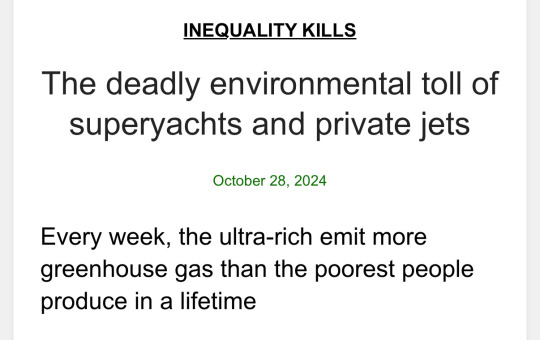
Source
Incredibly bleak
#socioeconomic inequality#environmentalism#news#climate#climate crisis#climate news#the left#eat the rich#capitalism#end capitalism#tax the rich#billionaires should not exist#progressive#activism#current events
649 notes
·
View notes
Text
ON BIRTHRIGHT and RHAENYRA
As another commentator of one of the TikToker Alexa's video said, "birthrights" are not dependent on what time they were given but what group you are a part of.
Here is the definition of "birthright":
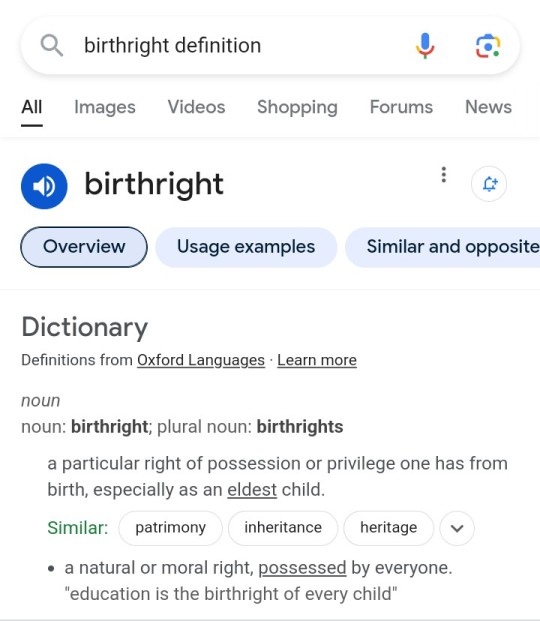

Nowhere does it state that it is about timing of when the problem was manually given. It is about a privilege one has ever since they were born. You were either born with that privilege or not, because it is a right/privilege a person has for being born into a particular group of people. A class, a heritage, a lineage, --as the definition above shows under "related" terms to "birthright".
America, Inherited Concepts from Europe
As it is everyone's "birthright" for their communities and governments to provide access to clean water because they are living beings/people and part of said communities. A social class is a sort of group with its own political privileges and "rights". The English settlers and those descendants who called themselves the new American citizens, "founded" the new country, and drafted the Constitution conceived of "birthright" as being for those white persons both born on the "soil" of the former colonies--these were considered citizens--AND those who were were born out of the colonies (the West Indies or Scotland) but participated in the Revolutionary movement in some significant way were the only those deemed eligible to become a president:
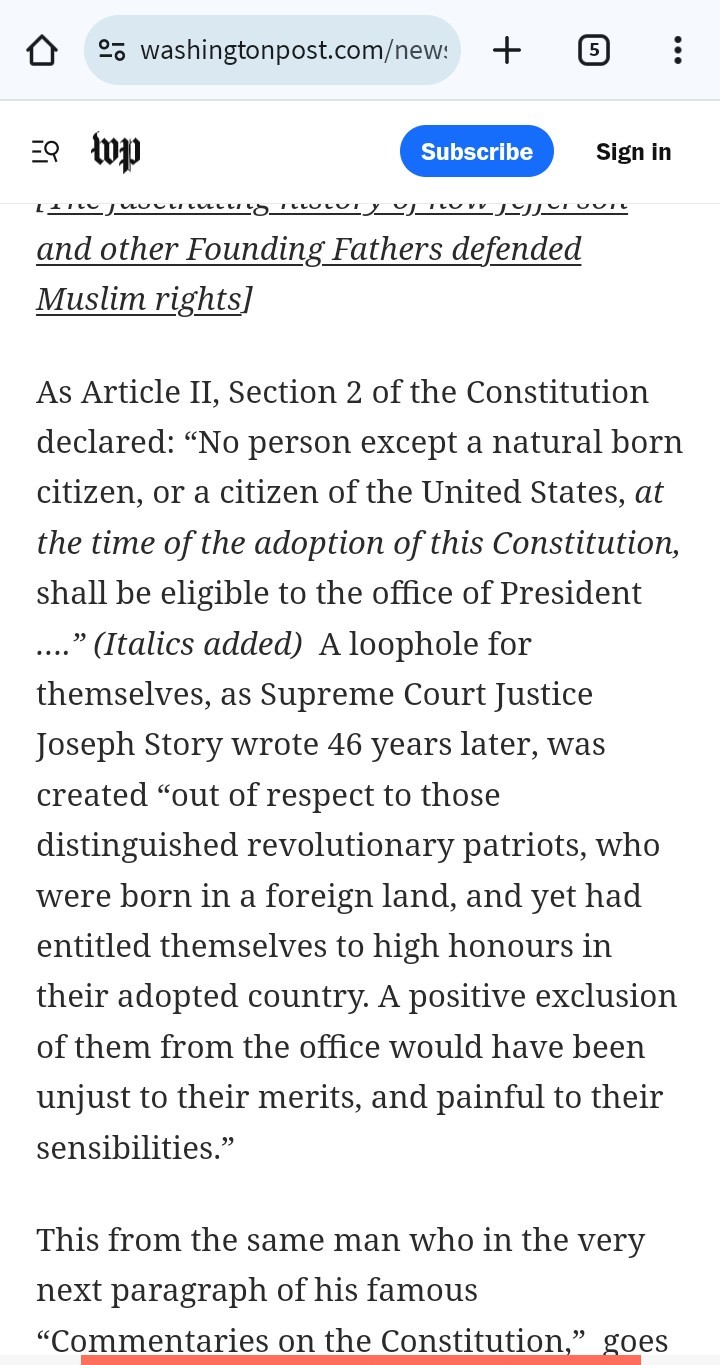
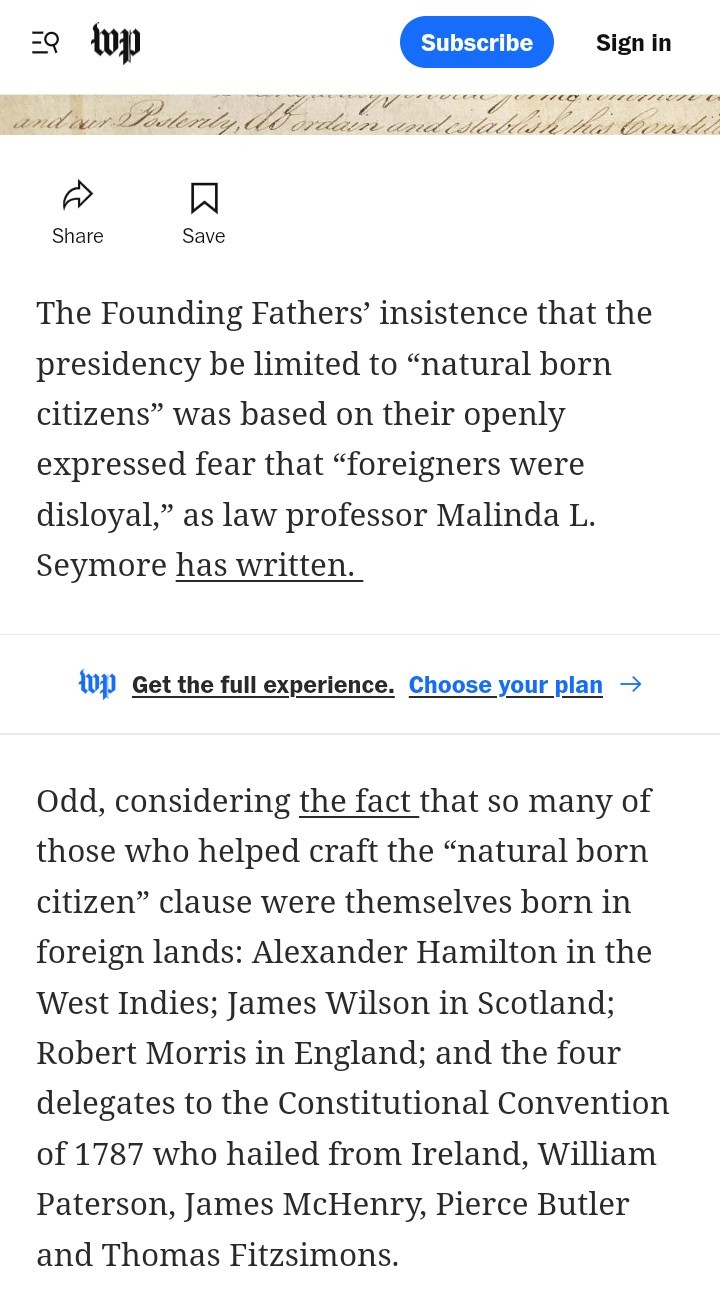
Obviously this shows an instance of the creation of an institution to be exclusive to those of an already existing socioeconomic group: rich, white, male property owners who no coincidentally also had more access to a political education inherited from their former European and English ancestry from childhood.
Application to Hereditary Monarchy (and Aristocracy)
A royal class or rank is an example of a human social group with its own exclusive "rights" to a thing, and in their case to certain privileges or access to resources and power. One such privilege is their place in the royal succession and even within their group, some have more privilege or right than others depending on how related they are to the monarch. The similar condition is for non royal aristocratic families. This is how lines of successions work in the sort of monarchist/feudalist system the Westerosi have and the most common and familiar sort of transfers of power and/or property.
Therefore, all royals or people born into royalty, thus related to the present or past monarchs, have a sort of claim on the throne; and sons, daughters are usually above uncles and aunts and cousins or second cousins in noble or royal lines of successions. As the OG Alexa said in her reply to this comment, the Targ royal succession had been in more of an ambiguous state in regards to which family member should have more claim than others in the line of succession: the brother of a king, or his children, or his daughter.
I'm referring to Maegor vs Rhaena or Prince Aegon. Because Maegor was male and visibly stronger and less people pleasing or hesitant than his older brother Aenys, Visenya proposed that they marry Maegor to Rhaena to sort of combine their claims into one AND prevent any sort of succession crisis, and this would have also advanced Maegor as the active heir or Aenys' heir presumptive even over Rhaena. But Aenys' choice to set a stronger precedent for a son over a brother by naming Aegon as his heir apparent and married Rhaena to him. Again, Rhaena was Aenys' oldest child. Aenys performed more of an male-preferred primogeniture bc he thought that making this Andal custom the determining factor for his choice of heir would appease the Faith and enough lords to accept some divergent decisions he will make. One of them marrying his children together. Whereas if he chose Maegor as his heir, then there would have been a precedent for the royal succession to be agnatic, where girls would have even less claim when a brother or a male cousin becomes heir or is above her in the line of succession until girls or just not considered dinnyhe line at all. However, Aenys dies, Maegor kills Aegon, Rhaena later refuses to take the throne or press for it even though she is older than Jarhaerys and there were those who argued towards her favor by her being the firstborn PLUS Jarhaerys had the male-preferred primogeniture supporter Rogar Baratheon, who housed him, Alysanne, and Alyssa Velaryon when Maegor came into power and later raised armies and levies for Jaehaerys against Maegor towards the end. So Jarhaerys became king and later we still have the matter of royal succession opened in the Great Council, where a male line and a male are both voted to matter more. And with both Maegor and Jarhaerys, girls were chosen to be their heir presumptive until such time as they had sons, but eve this choosing a girl as their heir reveals how more arbitrary the royal succession was.
All members of the royal line had a "claim" to the throne. Some obviously have more customary claims or "stronger" and prioritized claims than others because they are more directly related to the present monarch/lord. And the added layer of this being a male-preferred primogeniture society, but this doesn't negate that girls were considered viable heirs. The monarchy of Westeros has always been in more of a flux and a process and circumstantial than you'd think. And with girls and women have having had become ladies in their own independent right at times when there was no male sibling, older or younger, in other houses, yes Westeros is not an agnatic society but male-preferred one that does everything in it's power to promote men but will make use of a woman or girl if there is one, even as just placeholders. (Marla Sunderland Sheira Blackwood).
Before Viserys even named her as his heir apparent, Rhaenyra had a customary birthright to the throne by virtue of the fact that:
1) she was born into the royal family (the social group with certain exclusive rights, the throne in question) and thus a part of the royal line [thus "birthright"
2) she is Viserys' biological first surviving child
Viserys naming her as his heir AND getting those oaths to protect her rights that are also his decision, his royal declaration and thus it becoming law are all really the sealing elements of her birthright. They all revealed what was already true about girls and Rhaenyra's birthrights but was socially and optically undermined by women's social value and men's habitual violence to reinforce their own control and authority over others, and especially women. Violence used against women as well, as with Agnes Blackwood and perhaps Marla Sunderland. Later with Rhaenyra, when Aegon killed her and made Sunfyre eat her.
The Widow's Law
Even when we look to the Widow's Law, we see how Jaehaerys made it so that:
1) the sons of the first wife (thus the older children) had more claim or were legally prioritized to any resources, titles, and leadership-of-house left behind by the lord OVER any of the second/third/etc. wife's kids. If there are no sons by that first wife, then it goes to the eldest daughters of the first wife x the lord.
2) a man could NOT disinherit their kids by their first wife to "bestow lands, seat, or property on a later wife of her children".
QUOTE:
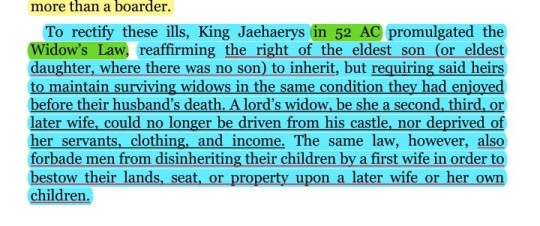
Under both conditions of such law, Rhaenyra, again, we can say has much more customary claims than her brothers born of Alicent, Viserys' 2nd wife. But this is more of a strong option at Rhaenyra's disposal to use than a necessary ingredient to how her claim is default as well as coming from a legitimate birthright and customary. Because of all I mentioned for Viserys naming her, the oaths, etc.
We see that it is, again, a matter of looking at Westerosi society being of men having more privileges and being able to lead armies and households and determining others' futures BECAUSE they EITHER have actively use armies, wars, executions, humiliations, and personal violence and executions against women to and other groups to make way for their own places as heads of those households (violent submission) OR like with the unnamed Lannister woman who married a no Lannister man who then became the head of the household, they have married a House women to a man and those around the couple--be they family or not, just those who had power and an edge over her--decided that it would be that way.
This goes to show what GRRM has already said notably recorded in the So Spoke Martin website, that this is a society where men choose which laws and which customs to either ignore or reemphasize according to their own advantage until it comes down to 'a force of arms'. ":
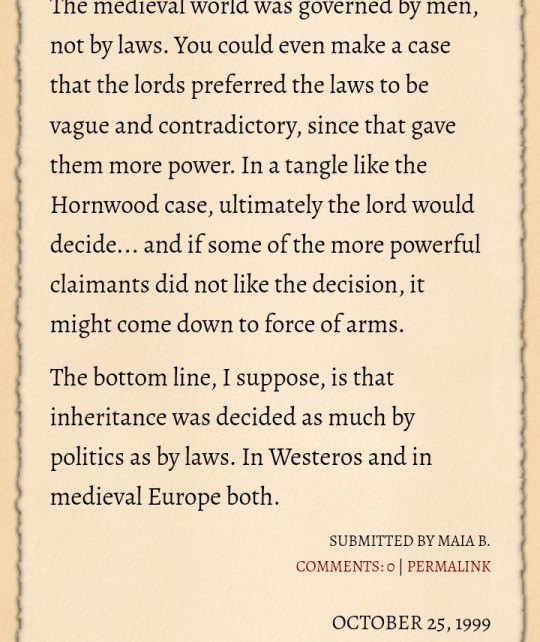
And it is almost always a deliberate thing to consider the language you are saying when writing up laws. Especially in the 2nd clause of the Widow's Law, Jaehaerys left open who of the first wife's kids had priority over the resources or seats the lord left behind and could bestow on an heir. It says "children" instead of "sons". Even in the first clause, Jaehaerys did not write that the second wife's sons inherited before the first wife's daughters. It just says that the first wife's sons inherit before the first wife's daughters. Thus, the language Jaehaerys uses leaves it open to argue in favor of Rhaenyra if one presses for it from a 'legal' angle instead of a custom one or if you wanted to emphasize the legality of a King's word.
Jaehaerys was not stupid, so why didn't he use more specific language in both clauses that specify a lord's second wife's sons would go before a first wife's daughters? That is the question we should be asking and speculating on, though I have my own conclusions. I think that he wanted to leave things more ambiguous so that he doesn't look like he's infringing too much on a lord's right to make his own heirs....it's just that, like what is ALREADY CUSTOM, he made it so that the eldest children's privileges & rights &/or ways of self sustaining weren't bulled over or removed for a younger child/set of children. It is already custom for the eldest living kid to inherit the most important or largest "things" in the Andal-FM feudalist society.
To Conclude 🫵🏿
Therefore, there is good reason from customary succession conditions in Andal-FM Westerosi history, legal precedent, and largely present conditions, for us the readers to say Rhaenyra had a birthright AND for Rhaenyra to claim Aegon stole her birthright that had been reinforced by the King's word and continued insistence on it.
Even without Viserys naming her as heir, Rhaenyra already had a customary birthright to the throne because she was born into the royal family and inherited the Targaryen heritage itself. Viserys naming her his heir really made her claim the strongest and the priority, despite her gender. Viserys made it official when Aenys' did not. Again, we must remember that Rhaena had supporters after Maegor's death to become Queen AND she said point blank to Jaehaerys that Dragonstone was hers by right of birthright, as the eldest child.
The insistence that Aegon instead of her become the king comes from the agenda of making men lead society regardless of their vices or virtues, as well as have privileges and powers over pretty much anyone who are not as powerful as them or could match them or that they cannot find familiarity.
#rhaenyra targaryen#widow's law#jaehaerys i#westeros succession#westerosi society#women in westeros#westerosi women#westerosi sexism#the dance of the dragons#asoiaf#fire and blood#hotd#house of the dragon#fiction vs reality#birthright#definitions#the queen's laws
37 notes
·
View notes
Note
what was the thought process for making crown a president in the 1960s? it seems so recent in history for a world-changing event like the dialup..or were there events in actual history at that time which lined up with your ideas?
I began writing an answer to this question without considering what I was aiming to describe and wound up writing an essay much longer than this answer wound up being (I went back and checked! I went back to write this!) but I'm not a historian, just a two-bit game dev, so I rewrote this answer to be as concise as possible (while fully answering the question.) I have a tendency to ramble.
The 1960's was a weird decade. In terms of societal/cultural change, I'm not sure any one decade in American history has a greater shift. Vietnam was the first war the US fought and blatantly lost (and with significant civilian opposition during the war, something never seen before, with even wars with significant political opposition (eg Mexican-American + Spanish-American wars) still having the support of much of the American public.) The civil rights movement advanced considerably with the passing of the civil rights act of 1964 and voting rights act of 1965. The 50's had significant change too as I'll mention later, though these civil rights acts had support from congress, and from the political party that had opposed previous civil right advancement no less, leading to a gigantic voting demographics shift that has largely remained to this day.
The Cuban Missile Crisis happened, which is the closest the world has come to nuclear war, arguably. MLK and Malcolm X were both assassinated, alongside a sitting US president (in broad daylight.) When cultural leaders get shot, that's a sign that things are really heating up.
The 40's + 50's weren't actually great decades for American counterculture. The tireless work from civil rights activists during the 50's shouldn't be forgotten either ofc, with Brown vs the Board of Education, the Federal government enforcing the Supreme Court's ruling in Little Rock and the Montgomery bus boycotts, but generally, questioning American foreign policy and criticism of capitalism were treated with ruthlessness - civilians were brought before HUAC and actors theorized of having communist sympathies blacklisted by the Screen Actor's Guild (whose head was none other than a young President Ronald Reagan.)
Not only did this keep 'Unamerican' perspectives out of the American media, but America also spent an impressive amount of money on war propaganda in the 40's (with even heavy-hitters like Disney pumping out cartoons to increase public support for the war), making US patriotism very popular before the 50's, which only became further cemented with McCarthyism taking hold by the early 50's. "Under God" was added to the PoA and references to God was added onto the American dollar to further separate US culture from atheistic marxist-leninist cultures like the Soviet Union.
While the 50's saw certain socioeconomic advances, it was also a time of cultural/political regression... followed by a time of mass political unrest/revolution. Think of the 1920's compared to the 1930's, say. This kind of political shift makes for the perfect petri-dish to produce powerful demagogues.
The early 60's is a really weird time because it's perfectly cemented between the dissolution of McCarthyism and the complete reorganization of the American political establishment, including counter-cultural ideas gaining mainstream appeal. Any earlier or later, and Crown's ideas probably wouldn't have had the same momentum. If Crown had ran for office any later, he'd have stopped much sooner, imo. Part of Crown's rise was down to how much his enemies underestimated how large his movement would become and how sweeping his brand of populism would be (with even people like Norm getting swept up in it.)
TL;DR: The early 60's was the perfect period of time for a man like Crown to gain a foothold in mainstream culture without his enemies realizing just how dangerous he was to them... by 1964, they understood all too well.
108 notes
·
View notes
Text
THE PLUTO IN CAPRICORN GENERATION'S ATTITUDE IS THE PROOF THAT WE ARE GOING THROUGH A PARADIGM SHIFT
The average 4 year old spends more than 3 hours each day in front of a screen. Isolated, with no human interaction and their ability to read human emotions and perform complex cognitive functions declining constantly.
The Pluto in Capricorn generation holds a direct mirror to our socioeconomic and technological structures.
Pluto = breaking, transforming, war, power games, death, metamorphosis
Capricorn = socio-economic structures and organization, careers, institutions
After the 2008 crisis and COVID-19 AND the current silent depression we are moving through, looking at the way children of that generation behave, shows us where our societal constructions failed. So here are some observations :
- Many Pluto in Capricorn kids want to pursue a career path out of the norm. They want to be influencers or own online businesses. Very few of them are interested in traditional paths of wealth like banking and finance.
- They don't have respect for school and education because they feel like it doesn't teach them enough. Most of the kids also went through 2 years of online school and they missed out on the social perks the schooling experience provides.
- Violence. This generation is mad at the system. They quiet quit. They hate supervisors and "gurus" and they are also looking for extremely masculine figures, like Andrew Tate. A few days ago I stumbled upon the Candace Owens talk with Andrew Tate and he appeared a bit "reformed". Guess what? The young men in the comment section did not like his slightly changed views on marriage and women.
- This kids consider Facebook and Instagram "old". They like crypto and decentralised platforms. They are simultaneously very street smart but not that interested in formal education.
- It feels like these kids had to grow up very fast in a world that seems unforgiving and harsh. They may be more unemotional and less empathetic, especially if personal placements support that.
#tarot#astrology#tarot reading#pick a card#pick a pile#pac reading#pick a photo#pick a picture#soulmate#future spouse#pluto in capricorn#gen x#gen xers#astrology aspects#astrology tumblr#astrology tips#astrologer#astro observations#pluto#capricorn#source:thesirencult
133 notes
·
View notes
Text
calling all library workers who follow me:
i've been asked to interview a customer-facing library worker and ask them about how their library has responded to socioeconomic issues such as the opioid/drug poisoning crisis, homelessness, book bans, etc., and any personal strategies they've found effective.
the interview would be between 10-30 minutes over Zoom or Teams, and i'd provide the questions prior to our meeting date.
reply to this post or DM me if you're interested. i wanted to reach out to my followers first bc i know some of you work in libraries :)
10 notes
·
View notes
Text
Encouraging Bad and Expecting Good – Asrar Qureshi’s Blog Post #841
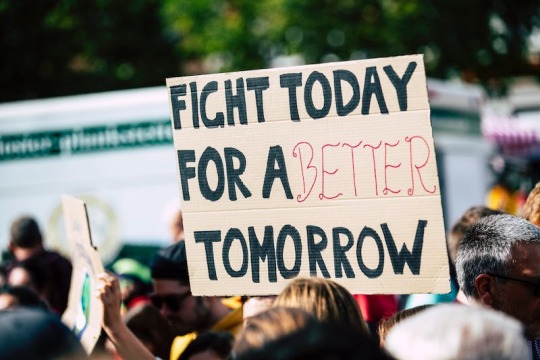
View On WordPress
#Asrar Qureshi#Blogpost841#economic crisis#Economy#Pakistan#Pharma Veterans#Political people#Politics#Religion#Social Media#Societal Culture#Socioeconomic Impact
0 notes